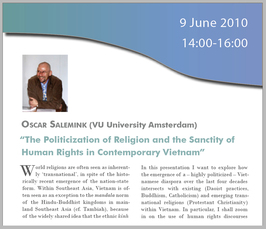"The Politicization of Religion and the Sanctity of Human Rights in Contemporary Vietnam"
- Datum: 09.06.2010
- Uhrzeit: 14:00 - 16:00
- Vortragender: Oscar Salemink (VU University Amsterdam)
- Ort: MPI-MMG, Hermann-Föge-Weg 11, Göttingen
- Raum: Library Hall

For more details please contact vdvoffice(at)mmg.mpg.de.
World religions are often seen as inherently ‘transnational’, in spite of the historically recent emergence of the nation-state form. Within Southeast Asia, Vietnam is often seen as an exception to the mandala norm of the Hindu-Buddhist kingdoms in mainland Southeast Asia (cf. Tambiah), because of the widely shared idea that the ethnic kinh population of Vietnam had a strongly developed ‘national character’ (as brought out in such works as Keith Taylor’s The Birth of Vietnam). Yet, also putatively ‘nationalistic’ Vietnam has been influenced by more or less transnational creeds like Buddhism, Confucianism, Daoism, Catholicism (since the 17th Century) and Protestantism. The influential colonial era religious scholar Léopold Cadière theorized Vietnam’s religious nationalism by distinguishing between indigenous religious beliefs and practices such as ancestor worship and ‘externally imposed’ Chinese religions.
In this presentation I want to explore how the emergence of a – highly politicized – Vietnamese diaspora over the last four decades intersects with existing (Daoist practices, Buddhism, Catholicism) and emerging transnational religions (Protestant Christianity) within Vietnam. In particular, I shall zoom in on the use of human rights discourses and organizations in conflicts between the Vietnamese State and each of these religious communities. Based on my own research and that of others, I shall argue that the nature of these conflicts is different in each case, but that the appeal to the ‘secular religion’ of human rights creates a volatile arena of localized and transnational contestations between positions that can be described in terms of ‘political religions’ and ‘politicized religions’ which both seek to legitimize and sacralize their actions with reference to sacrosanct human rights.